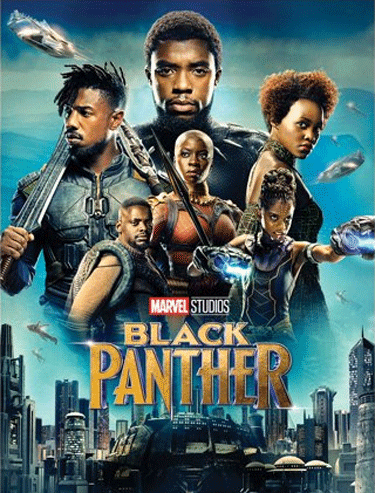The wildly-successful superhero movie has been nominated for Best Picture at this year’s Academy Awards, but there’s a lot more at stake for the Academy than there is for Black Panther. The Center’s director explains.
______________________________
By Jeffrey Cole
Black Panther will do very well at the Oscars.
Action films and superhero films rarely are even mentioned at the Oscars. For the past generation, there has been an inverse relationship between a film’s box office success and honors at the Academy Awards. The three most recent examples of small box office films winning are: The Shape of Water, Moonlight, and Birdman. (Exceptions over the past 25 years are few, including Titanic and the finale of The Lord of the Rings.)
 This has caused a serious problem for the Motion Picture Academy. Most of the Academy’s funding (some $70-90 million) comes from licensing the telecast to ABC. The problem is that the ratings have been declining for a number of years. In 2018, 26.5 million people watched some or all of the Oscars telecast. Four years earlier the total was 43.7 million.
This has caused a serious problem for the Motion Picture Academy. Most of the Academy’s funding (some $70-90 million) comes from licensing the telecast to ABC. The problem is that the ratings have been declining for a number of years. In 2018, 26.5 million people watched some or all of the Oscars telecast. Four years earlier the total was 43.7 million.
That’s a loss of 40 percent of the audience in just four years.
A healthy financial future for the Motion Picture Academy rests on ABC (which has the rights until 2028), or some other channel thereafter, paying the Academy more and more each cycle for the show. That is unlikely to happen if the ratings continue in free fall.
In its last contract negotiation, ABC, worried by the serious and continued drop in ratings, demanded the right to be consulted on the choice of host and producers. The Academy, rightly concerned that at some point its license fee for the broadcast will be sharply reduced to fall more in line with the value of the ratings, has taken some serious steps and mis-steps to improve the audience size, particularly among the young.
Looking for the right hosts
The Academy has tried to find hipper hosts for the show. That effort was what led to the fiasco of Anne Hathaway and James Franco co-hosting in 2011. It didn’t attract the younger demographic and alienated the existing audience.
In 2012, Billy Crystal returned after seven previous stints as host, but he was a late replacement when Eddie Murphy suddenly dropped out. After that were Seth MacFarlane, Ellen DeGeneres, Neil Patrick Harris, Chris Rock, and Jimmy Kimmel (twice in the last two years).
Even though there is no evidence that the host can affect viewing levels, this year the job was offered to Kevin Hart, who declined, reconsidered, and then declined again. This may be the first year with no host. That would certainly lower the costs and probably not diminish the ratings.
The way to improve the show’s ratings does not seem to run through the host. In the past, the show had semi-regular hosts who appealed to mainstream America: Bob Hope hosted 19 times, Billy Crystal hosted eight times, and Johnny Carson hosted five times.
Considering the successful history of non-edgy comedians as hosts, it’s surprising Jerry Seinfeld never hosted.
10 Best Picture nominees and one really terrible idea
Beyond finding hipper hosts to increase the audience, the Academy—in order to get more popular films nominated and, it hoped, increase audience interest—expanded the Best Picture category from a minimum of five films to as many as ten. This year there are eight films up for Best Picture.
The sense is that if the broadcast could showcase the stars and creative teams of immensely popular films, then younger people, the ones most likely to have seen the film, would find more that was familiar and resonant in the Oscars telecast.
The problem was that the Academy expanded the category in order to get successful films nominated, but those films almost always lost to smaller, less familiar films that the target audience had not seen.
Increasing the category didn’t help the ratings. Continuing the effort to bring the younger audience to the show, a new category “Outstanding Achievement in Popular Film” was proposed after the 2018 Oscars.
Had this change happened in 2010, it would have been a way for Avatar to win “popular film” while The Hurt Locker won the real Best Picture award. Likewise, in 2011 The Social Network or Inception or Toy Story 3 could have won the popular category, still leaving The King’s Speech to win Best Picture. In 2012 it would have been Moneyball for the popular Oscar and The Artists for the real Oscar, and so on, and so on.
______________________________________________________________________________________________
In its last contract negotiation, ABC, worried by the serious and continued drop in ratings, demanded the right to be consulted on the choice of host and producers. The Academy, rightly concerned that at some point its license fee for the broadcast will be sharply reduced to fall more in line with the value of the ratings, has taken some serious steps and mis-steps to improve the audience size, particularly among the young.
_______________________________________________________________________________________________
Everyone was confused and feared (correctly) this would this create two classes in the Academy: quality art films and popular films. Couldn’t a film be both? Would a hugely successful film be marginalized in the popular category, leaving space for the smaller, less prominent film in the real Best Picture? The new category was so confusing, demeaning to filmmakers, and unpopular that it was quickly scrapped (“put on hold,” according to the Academy) before it ever saw the light.
Will the king of Wakanda be the king of the Oscars?
All this brings us to Black Panther: earning over a billion dollars and most critics’ raves, it became a serious contender for Best Picture. It is no surprise that it was nominated, the expansion of the category practically ensured that.
This year, the most popular film is also the best film, and it might actually win the Oscar for Best Picture.
While the fact that the film had almost an entirely black cast and director is an important achievement in the effort to mitigate #OscarsSoWhite, that is not why it will win. To argue otherwise is to claim the Academy is rewarding an African-American film that might be less-deserving than some other film. That is clearly not the case. Black Panther is not an affirmative action film .
Black Panther is a well-made and hugely successful film that deserves its Best Picture nomination. Had the popular category gone forward, it would have easily dominated that award, and it would probably have been stuck there when it deserved a Best Picture nomination.
Black Panther deserves to win on its merit. Conveniently, it also solves the Academy’s broadcast problems . It can do what hip hosts and more Best Picture nominees cannot do: align the Oscar winners with the younger audience so important to the telecast’s ratings.
The Motion Picture Academy is coming down to the wire. In the past, the Oscar’s ratings were one of the top three shows of the year, along with the Super Bowl. In 2018, it barely won the week.
Is the worst-case scenario really that bad?
If the ratings free fall continues, at some point ABC will substantially cut the license fee, crippling the Academy, or drop the show altogether.
That could be a good thing. If the ratings fall below the threshold that a broadcast network seeks, it could become a prestige live-streaming show for Netflix, Hulu or Amazon. Those companies could continue to pay the high license fees without concern of selling the show to advertisers. The Academy could then award films on any standards it chooses, whether it was agreeable with wider audiences or not.
The Oscar telecast is at a crossroads. The fact that no one wants to host in 2019 proves that.
Black Panther is the best path to redeeming the show.
____________

Jeffrey Cole is the founder and director of The Center for the Digital Future at USC Annenberg.
See all columns from the center.
January 30, 2019

